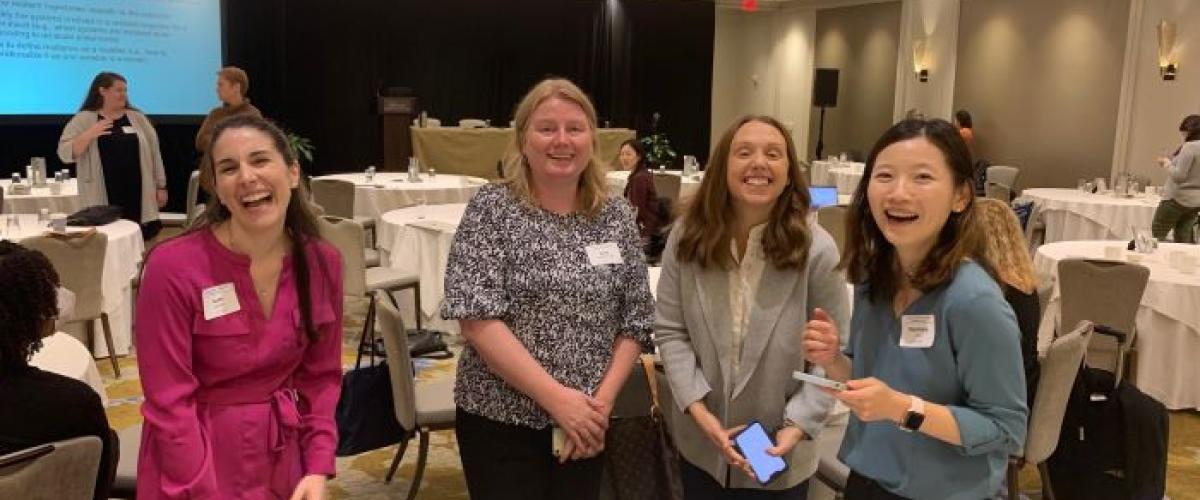
The Research and Education Component issues requests for proposals every two-years to fund up to three Pepper Career Development Awards per cycle. These awards go to Duke early-career investigators with promise in the field of aging research in reserve and resilience.
Duke Pepper Center Research Career Development Award Request for Applications, 2026 Cohort
Purpose of the Award: The goal of the Pepper Research Education Component (REC) is to promote the development of future research leaders who are conducting basic, translational, or clinical research within the focus area of physical reserve and resilience. The REC will award up to 4 career development awards, of 2-year duration, with funding beginning July 1, 2026, contingent on successful renewal of our Center Grant. The award can cover salary, project support, and research career development activities. REC scholars are supported by the Pepper Center Research Cores listed above, and meet regularly with a mentorship team including Pepper Center Investigators. At the conclusion of the award, REC scholars are expected to pursue external funding in their research area.
Eligible Candidates/Scholars: Candidates should be within 5 years of their first faculty appointment or an advanced fellow/postdoctoral student with clear plans for transition to faculty status by July, 2026. Only U.S. citizens or non-citizen nationals, or an individual lawfully admitted for permanent residence who possesses an Alien Registration Receipt Card (I-151 or I-551), or some other verification of legal admission as a permanent resident prior to appointment, are eligible due to NIH regulations. Individuals on temporary or student visas are not eligible. Candidates must be able to commit a minimum of 6 calendar months of full-time professional effort for career development and research activities.
Click the link below for the full RFA document with application instructions and important dates:
Career Development Award Cohorts

Joshua Johnson, PhD
Assistant Professor in Orthopaedic Surgery
Enhancing resilience among patients with stroke: implementation of high intensity home-based rehabilitation
Dr. Johnson's primary research interest is in the optimal utilization of rehabilitation services during patients' transition from the hospital to post-acute care.

Neill Li, MD
Assistant Professor in Orthopaedic Surgery
Investigating the role and interactions of macrophages on the age-associated changes of the neuroimmune response in peripheral nerve regeneration
Dr. Li's research interest is in understanding and improving age-associated outcomes of nerve injury and surgery from the bench to the bedside.

Leanna Ross, PhD
Assistant Professor in Medicine
Maximizing physical reserve and resilience through precision exercise medicine
Dr. Ross' research interest is in exercise response heterogeneity and the mechanisms by which exercise interventions – differing in amount, intensity, and mode – elicit short- and long-term cardiometabolic health benefits. The goal of Dr. Ross' research is to develop an integrative molecular-physiologic-bioinformatic approach to design precision exercise interventions, optimizing the prevention and management of cardiometabolic diseases.

Leah Acker, MD, PhD
Assistant Professor in Anesthesiology
Pilot testing of a non-invasive, neuroimmune modulation tool—transcutaneous auricular vagus nerve stimulation (taVNS)—to enhance perioperative cognitive resilience in older adults

Sonali Advani, MBBS, MPH
Assistant Professor of Medicine - Infectious Diseases
Choosing urinary tests wisely to prevent infection-related stressors that impact resilience in older adults
Dr. Advani's main research interests include prevention of catheter-related harm, implementation of diagnostic stewardship interventions, quality improvement, and improving metrics to better align with outcomes.

Kimberly Hreha, EdD
Assistant Professor in Orthopaedic Surgery
Evaluating physical resilience and best practices in vision rehabilitation of stroke patients: A mixed methods approach
Dr. Hreha's independent line of research has evolved to not only study spatial attention disorders, but vision impairments due to age and neurological conditions. The strategy of her lab is to use multiple methods, such as secondary data analyses and intervention development, to close research gaps and ultimately improve the visual and cognitive health of aging stroke survivors.
Brian Andonian, MD (Division of Rheumatology and Immunology/Dept. of Medicine)
Accelerated metabolic aging in rheumatoid arthritis immune cells and skeletal muscle: A pilot study
Rheumatoid arthritis (RA) is a model disease for studying premature aging. Persons with RA suffer from early aging-associated metabolic comorbidities, and are at risk for low resilience, a decreased ability to resist functional decline. Mitochondrial function in RA and aging is a marker of cellular reserve, and is thus important for preserving resilience. RA and aged immune cells have abnormal mitochondrial function, which coincide with immune dysregulation. Skeletal muscle in both RA and aging is also marked by altered mitochondria. The pilot study will investigate whether dysfunction of mitochondria, the cellular metabolic “engine,” connects RA peripheral helper T-cells, macrophages and skeletal muscle abnormalities.
Objectives are twofold: to determine whether RA T cell, macrophage and skeletal muscle mitochondrial function abnormalities are associated; and to determine associations of exercise training on RA immune cell and skeletal muscle mitochondria.
Ming-Feng Hsueh, PhD (Dept. of Orthopedic Surgery)
Harness human cartilage repair capability to prevent and reverse osteoarthritis
Humans have a natural cartilage repair response which is high in the ankle, intermediate in the knee and low in hip cartilages. This repair response in humans is highly associated with the microRNAs used by salamanders and other limb regenerating animals to regenerate whole limbs. This project will evaluate the ability of microRNAs as a therapy to improve cartilage resilience to injury in vitro, and build the foundation for further evaluation in animals for microRNAs' ability to prevent and reverse the most prevalent of age-related diseases, osteoarthritis, for which we currently have no disease-modifying treatments.
Daniel C. Parker, MD (Division of Geriatrics/Dept. of Medicine)
Identification of biomarkers of cognitive resilience in the Duke Performance Across the LifeSpan (PALS) Study
Cognitive resilience is defined as preserved cognitive function in the setting of “stressors” that adversely affect cognitive function; it may explain – in part – the heterogeneity of cognitive function in older adults who otherwise appear clinically similar, especially with respect to risk factors for Alzheimer’s disease and related dementias (ADRD). Blood-based biomarkers of cognitive resilience would be useful to identify protective factors and test resilience-building interventions that preserve cognitive function in the setting of these stressors; currently, no such biomarkers exist. Building on previous work, I propose to develop a measure of cognitive resilience in a subset of community-dwelling older adults from the Duke Performance Across the LifeSpan (PALS; N=297) study with repeat cognitive testing over 3 years. Using this measure, I will identify biomarkers reflecting dysregulation in "Hallmarks of Aging" pathways that are predictive of cognitive resilience.
Nazema Siddiqui, MD (Dept. of Obstetrics and Gynecology)
Effects of aging and the urinary microbiome on recurrent urinary tract infections
Specific interests include: 1) pathophysiology of overactive bladder with particular emphasis on epigenetic mechanisms; and 2) studying the urinary microbiome with aging and in women with recurrent urinary tract infection. Additional interests include clinical outcomes research after surgery for prolapse and other pelvic floor disorders.
Corey Simon, DPT, PhD (Dept. of Orthopedic Surgery)
Physical Resilience to Pain with Activity Influences among Seniors (PRAISE) – Feasibility Study
Research focuses on development of tailored multi-factorial interventions that prevent disability among older adults with low back pain. Low back pain poses a major risk to senior health, as it is the global leader in years lived with disability and strongly associated with mobility disability. However, it is not clear why some older adults with low back pain succumb to mobility disability while others do not. This REC study will determine the feasibility of assessing three factors that may explain mobility disability among older adults with low back pain: pain with activity, fear of movement, and dynamic inflammatory response to movement.
Tony Sung, MD (Division of Hematologic Malignancies and Cellular Therapy/Dept. of Medicine)
High intensity interval training to improve pre- and peri-transplant function and outcomes
Research focuses on strategies to reduce complications of HCT and ranges from preclinical studies using murine models of HCT to Phase 1 and Phase 2 clinical trials. Areas of interest include the role of the microbiota (the trillions of bacteria living in and on our bodies), nutrition, and exercise in modulating HCT outcomes such as graft-versus-host disease (GVHD) and infections.
Jason Allen, PhD, Cardiology
Kelli Allen, PhD, General Internal Medicine
Raquel R. Bartz, MD, Anesthesiology
Dan Belsky, PhD, Geriatrics
Beverly Brummett, MD, Medical Psychology
James T. Cavanaugh PT, PhD, Geriatrics
Jessica Chia, MD, Pulmonary, Allergy and Critical Care Medicine
Jennifer Dungan, RN, PhD, School of Nursing
William Michael Foster, PhD, Pulmonary and Critical Care Medicine
Farshid Guilak, PhD, Orthopedic Surgery and Cell Biology
Katherine Hall, PhD, Geriatrics
Rasheeda Hall, MD, Nephrology
Susan Nichole Hastings, MD, Geriatrics
Matthew Hirschey, PhD, Chemistry and Biochemistry
Kim Huffman, MD, Rheumatology and Immunology
Kimberly Johnson, MD, Geriatrics
Lee Jones, PhD, Radiation Oncology
Timothy Koves, PhD, Geriatrics
Richard Lee, MD, Endocrinology and Metabolism
Helen Lum, MD, Geriatrics
David Madden, PhD, Psychiatry and Behaviorial Sciences
Micah McClain, MD, Infectious Diseases
Mehri McKellar, MD, Infectious Diseases
Deborah M. Muoio, PhD, Endocrinology & Metabolomics
Kent Nilsson, MD, Cardiology
Amy Pastva, PhD, Community and Family Medicine
Juliessa Pavon, MD, Geriatrics
Matthew Peterson, PhD, Geriatrics
Thomas Povsic, MD, Cardiology
Jama L. Purser, PT, PhD, Geriatrics
Arati Rao, MD, Medicine
Gregory Sempowski, PhD, Duke Human Vaccine Institute
Svati H. Shah, MD, MHS, Epidemiology, Medical Genomics
Heather E. Whitson, MD, Geriatrics





